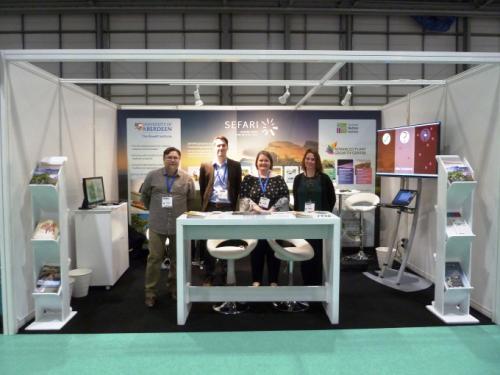Food and Drink is a hugely important sector for Scotland and the UK economy, generating a turnover of £14.4 billion and £5.3 billion of GVA (gross value added) for the Scottish economy in 2014 alone. This sector not only has an impact on Scotland’s economy but food production can also has a significant influence on our environment, health and society and these are all areas that SEFARI research aims to a make a difference.
SEFARI represents a unique, long term sustained and globally distinctive multi and inter-disciplinary research collaboration and which delivers the Scottish Government Strategic Research Programme (SRP, 2016-2021) for food, agriculture, environment, land use and rural communities; for 2016 -2017 alone this is a £34.2million investment in strategic research.
At SEFARI, through the SRP and research underpinned by it, we link research on primary agriculture and the environment to the food we eat through new approaches for agricultural production, investigating food supply chains, new foods and re-formulation, nutrition at all ages and on to the issues faced in achieving food accessibility and affordability within a population severely challenged by diets linked with ill health. A recent economic impact assessment of our previous SRP research has shown that even over a short period of time our work is delivering benefits along the whole food chain.
Economically, environmentally sustainable agriculture is critical to a thriving food and drink sector and is vital for securing access to sufficient safe and nutritious food. Examples of where we have and continue to make a difference through our research include:
- Long term sustained crop research working to improve yield, disease resistance and reduce the environmental impact of production, e.g. our barley and potato research.
- Improved livestock genetic selection e.g. to reduce greenhouse gas emissions and enhance welfare.
- Helped to develop Scotland’s Beef Efficiency Scheme, by working with ClimateXChange.
- Major breakthroughs in livestock disease; including the first vaccine in the world for a worm parasite of sheep and, working with EPIC (the Centre of Expertise on Animal Disease Outbreaks), our work has been central on delivering to the industry-led scheme to eradicate Bovine Viral Diarrhoea (BVD) in Scotland.
Moving from the farm towards the consumer, our research is establishing how diets and food influence our health at an individual and societal level. Pioneering work involving our scientists includes discovering how the type of food we consume can help weight management and improve health as a key approach to tackling the health burden of obesity. Dietary fibre is now acknowledged as a key factor in this approach and our ground-breaking research has shown that the microbes in the gut respond differently to the type of fibre eaten, opening up new opportunities to provide health benefits to the public.
We are also identifying natural bioactivities (chemicals that have a biological effect) within plants and their extracts, including using fruit and vegetable extracts (applicable to vegetable waste use) that could help in shelf-life preservation (antioxidants) and, by developing a unique understanding of how bioactives are available and used by the body, for delivering potential health benefits (e.g. in regulating inflammation or management of type 2 diabetes).
Critically, nutritional requirements vary and our research is examining how nutrition at all ages plays an important role in shaping health, e.g. by looking at the impact of diet during pregnancy and supporting the development of food products that are more appropriate for an older population.
Such understanding offers a huge potential for better food produce and new food ranges e.g. the “Fuller Longer” food range as developed by Marks & Spencer with expert input from our scientists and based on understanding gained from their long term strategic research and work underpinned by it. Also a detailed understanding of the nutritional and wider chemical content of plants linked to how our bodies use these is providing unique opportunities to inform crop breeding approaches e.g. in our research on learning from wild and underutilised plants.
In seeking to effect better relationships with food and the adoption of healthier lifestyles, understanding food-choice behaviours are complex but also offer opportunities to effect dietary change. Our latest socioeconomic analysis is working to better understand influences on food choice, consumer attitudes and beliefs; preferences regarding food authenticity and origin; assessing how consumers consider, balance and trade-off different preference criteria when purchasing foods; developing ways to measure and communicate healthy and environmentally sustainable diets to consumers; and examining household attitudes and behaviour on food waste.
In addition, by understanding the structure and effectiveness of short food supply networks, which connect Scottish manufacturers and consumers, we can aid in promoting rural development and sustainable, resilient communities.
Finally, here at SEFARI we also have access to an array of resources, facilities and collections which are extensive and nationally important e.g. the National Soils Archive, crop collections, research farms, livestock facilities and a state of the art Human Nutrition Unit to name only a few.
Ultimately we are working to ensure our research reaches those whom can benefit from it and our close long term partnerships with policy, farming, the food and drink sector, education and the public is vital to informing our work, enabling us to provide advice and putting our research in to practice, and this is why we go to events like Food Matters Live.
Therefore if you’d like to learn more and are interested in food and drink (and well who isn’t!) do come and visit us at stand 681. As well as discussing our latest research with you we are also excited to be piloting an innovative new project, called ‘My Food Our World’, which is a series of short films showcasing how our research is contributing to Scotland’s Good Food Nation bill and you will also find our scientists presenting at talks throughout the whole event too.
Dr Charles Bestwick & Dr Michelle Wilson-Chalmers.
